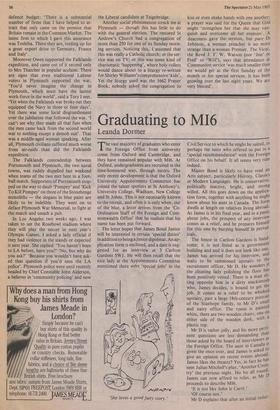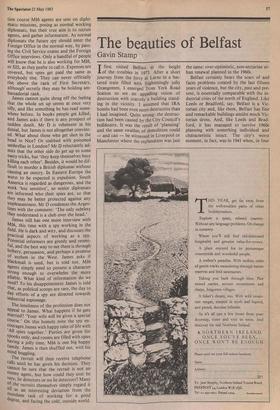Graduating to MI6
Leanda Dormer
"The vast majority of graduates who enter I the Foreign Office from university come from Oxford and Cambridge, and they have remained popular with MI6. At Oxford, undergraduates are recruited in the time-honoured way, through tutors. The only recent development is that the Oxford University Appointments Committee has joined the talent spotters at St Anthony's, University College, Wadham, New College and St Johns. This is not necessarily known to the recruit, and often it is only when, out of the blue, a letter arrives from the 'Co- Ordination Staff of the Foreign and Com- monwealth Office' that he realises that his name has been put forward. "The vast majority of graduates who enter I the Foreign Office from university come from Oxford and Cambridge, and they have remained popular with MI6. At Oxford, undergraduates are recruited in the time-honoured way, through tutors. The only recent development is that the Oxford University Appointments Committee has joined the talent spotters at St Anthony's, University College, Wadham, New College and St Johns. This is not necessarily known to the recruit, and often it is only when, out of the blue, a letter arrives from the 'Co- Ordination Staff of the Foreign and Com- monwealth Office' that he realises that his name has been put forward.
The letter hopes that James Bond Junior will be interested in certain 'special duties' in addition to being a junior dipolmat. An ap- plication form is enclosed, and a date is sug- gested for an interview at 3 Carlton Gardens SW I. He will then recall that the nice lady at the Appointments Committee mentioned there were 'special jobs' in the
`She loves a good fairy story.'
Civil Service to which he might be suited, or perhaps the tutor who offered to put in a `special recommendation' with the Foreign Office on his behalf. It all seems very ruin indeed.
Master Bond is likely to have read an Arts subject, particularly History, Classics or Modern Languages. He is conservative, politically inactive, bright, and strong willed. All this goes down on the applica- tion form, together with anything he might know about his aunt in Canada. The form dwells at length on relatives living abroad. As James is in his final year, and in a panic about jobs, the prospect of any interview comes as a relief, and he prepares himself for this one by burying himself in period- icals.
The house in Carlton Gardens is hand- some; it is not listed as a government building and and it does not look like one. James has arrived for his interview, and waits to be summoned upstairs to the recruitment officer, Mr D. He wonders if the cleaning lady polishing the floor has been positively vetted. There is a man sit- ting opposite him in a dirty mackintosh who, James decides, is bound to get the job. It comes as a relief to be whisked upstairs, past a large 18th-century portrait of the Stanhope family, to Mr D's small and nasty office. The room is painted white, there are two wooden chairs, one on either side of the wooden desk, with a plastic top. Mr D is rather jolly, and his more perti- nent questions are less demanding than those asked by the board of interviewers at the Foreign Office. The aunt in Canada is given the once over, and James is asked to give an opinion on recent events abroad. James likes the theatre? Yes, in fact he has seen Julian Mitchell's play, 'Another Coun- try' the previous night. Ho ho all round. James can now afford to relax, as Mr I) proceeds to describe M16.
'It is not like John le Carre.'
'Of course not.' Mr D explains that after an initial induc- tion course MI6 agents are sent on diplo- matic missions, posing as normal working diplomats, but their true aim is to recruit agents, and gather information. As normal diplomats the future spy should enter the Foreign Office in the normal way, by pass- ing the Civil Service exams and the Foreign Office interviews. Only a handful of people will know that he is also working for MI6, or SIS, as they prefer to call it. Expenses are covered, but spies get paid the same as everybody else. They can never officially rise above the rank of First Secretary, although' secretly they may be holding am- bassadorial rank.
James cannot quite shrug off the feeling that the whole set up seems at once very silly, and like something he has read some- where before. In books people get killed, and James asks if there is any prospect of sudden death. Mr D is vehement in his denial, but James is not altogether convinc- ed. What about those who get shot in the head in Nice? Or stabbed with poisoned umbrellas in London? Mr D reluctantly ad- mits that the other side do get up to some nasty tricks, but 'they keep themselves busy killing each other'. Besides, it would be dif- ficult to murder a British diplomat without causing an outcry. In Eastern Europe the worst to be expected is expulsion. South America is regarded as dangerous, and the work 'less sensitive', so senior diplomats are informed who their spies are, so that they may be better protected against any unpleasantness. Mr D condemns the Argen- tines with the comment: 'The only subtlety they understand is a club over the head.'
James still has one more interview with M16, this time with a spy working in the field. He is dark and wiry, and discusses the practical aspects of working as a spy. Potential informers are greedy and resent- ful, and the best way to net them is through bribery, persuasion, and perhaps a promise of asylum in the West. James asks if blackmail is used, but is told not. MI6 agents simply need to possess a character strong enough to overwhelm the more Pliable. What kind of information do we need? To his disappointment James is told that, as political scoops are rare, the day to day efforts of a spy are directed towards Industrial espionage.
The loneliness of the profession does not aPPeal to James. What happens if he gets Married? 'Your wife will be given a special course.' On this homely note the spy en- courages James with happy tales of life with All spies together.' Parties are given for snooks only, and rooms are filled with spies having a jolly time. MI6 is one big happy family. James is then shuffled out, with his mind boggling. The recruit will then receive telephone calls until he has given his decision. They cannot be sure that the recruit is not an enemy agent, but how could they ever be sure, lie detectors or no lie detectors? Many of the recruits themselves simply regard it all as an interesting deviation from the Mundane task of working for a good degree, and facing the cold, outside world.











































 Previous page
Previous page